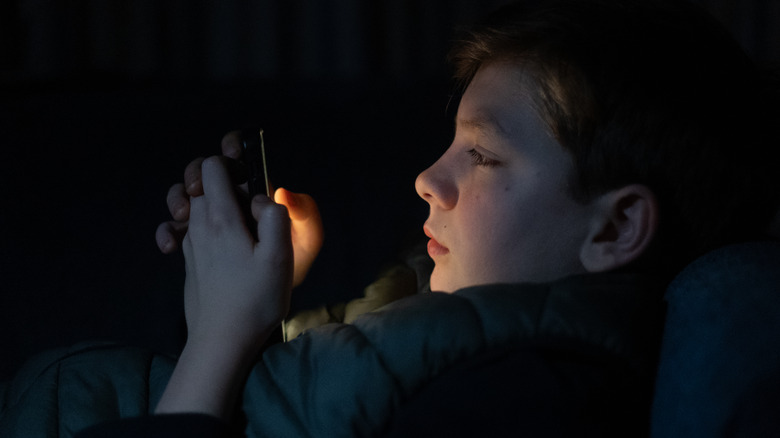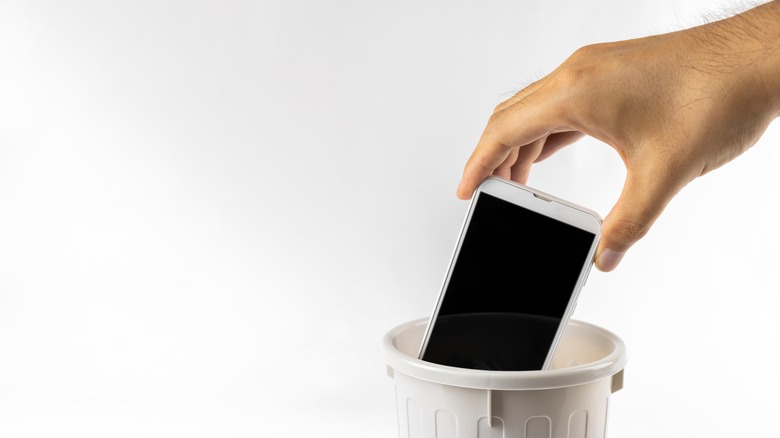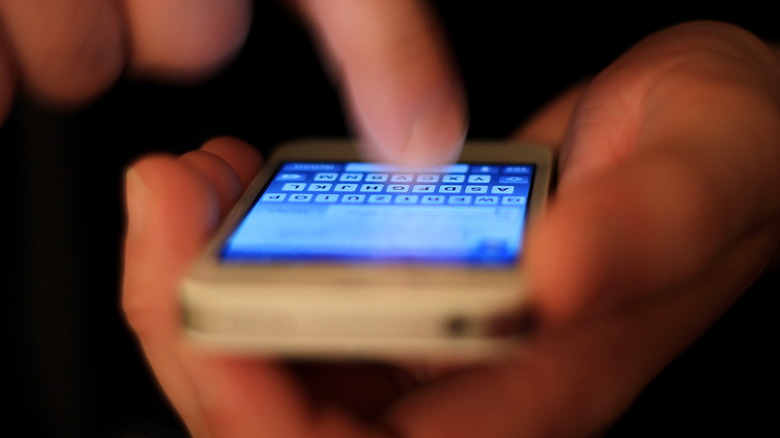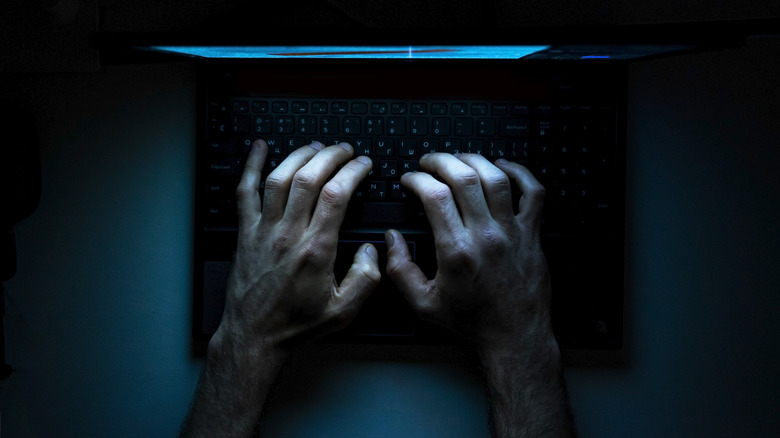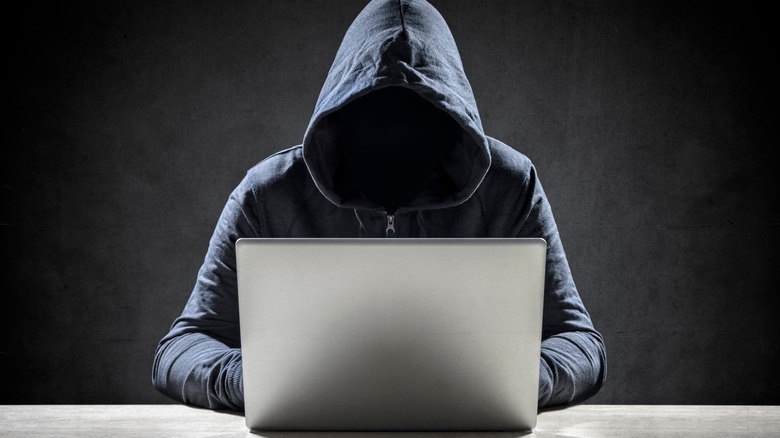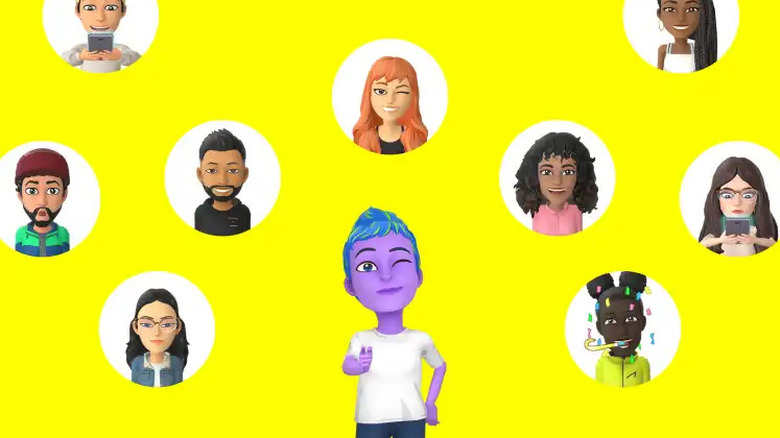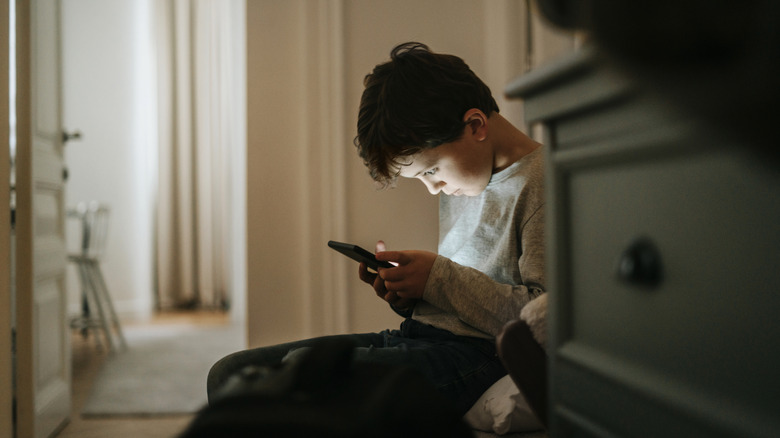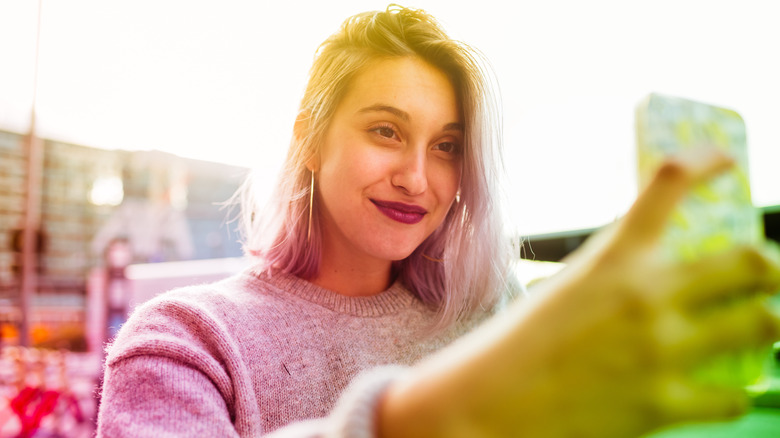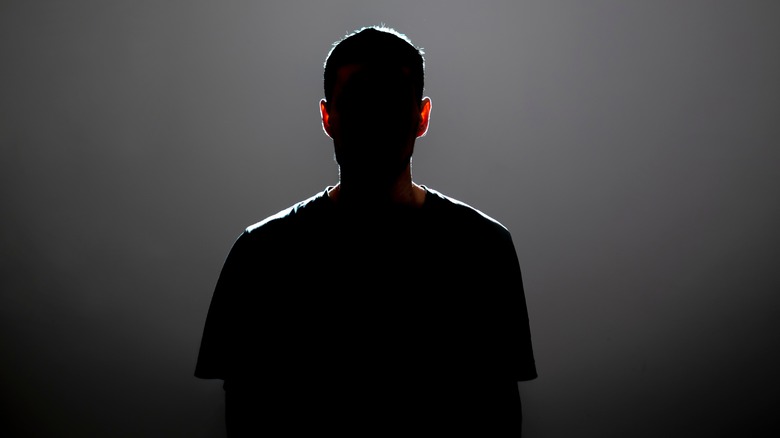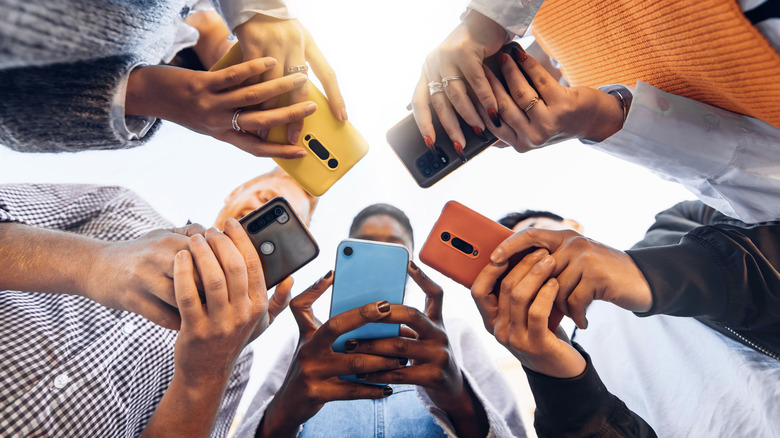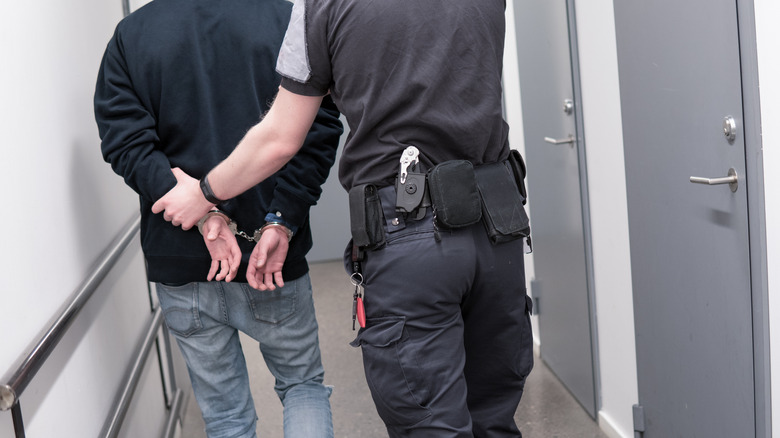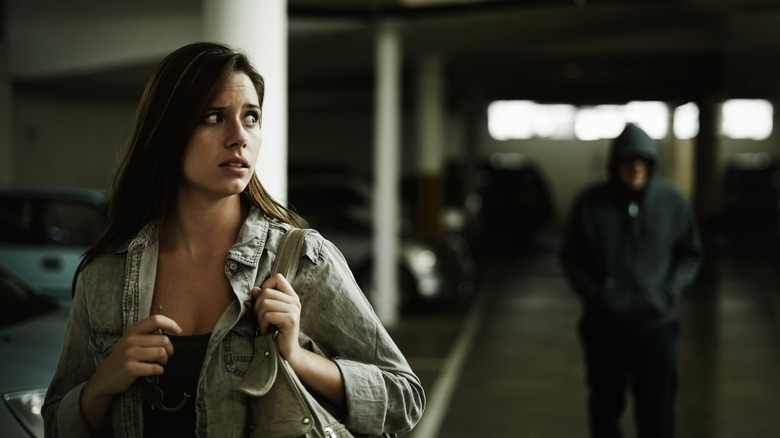The Shady Side Of Snapchat
In an age where TikTok, Instagram, and X (formerly Twitter) are the top dogs, it's easy to forget that once upon a time Snapchat was what all the cool kids were doing. Depending on the circles you hung out in and the friends you had circa 2015, you might have told someone to "Snap" you in the same way a person "Tweets" (sorry, "Xes") or "Duets." It almost — but not quite — shifted our communication from texts to our faces with the licking dog filter. Despite no longer being as trendy as it was in its heyday, Snapchat now has more users than ever before (almost a billion, to be more precise), and for the first time in its history has achieved many tech companies' biggest goal: profitability.
That last bit always raises an eyebrow, begging the question: Just what sort of deal with the devil did Snapchat have to keep its head above water? To the shock of no one familiar with the tech industry, this service has a dark side. Snapchat is neither private nor safe, and its slimy underbelly doesn't always get its share of the limelight when headlines focus on Facebook's Cambridge Analytica kerfuffle or Elon Musk's latest Twitter scandal. So today, we're taking a brief dive into the less savory chapters in the annals of Snapchat's history.
Trigger warning: There are discussions of child exploitation, stalking, and drug overdose deaths in this article.
Snapchat can't guarantee message deletion
Snapchat's foundational selling point can be summarized thusly: You send your friend a one-time picture message, and then it disappears forever. Everything else the app does is just window dressing. This would make it deeply concerning, then, if those messages aren't guaranteed to be deleted. Spoiler alert: they aren't, to an extent. The FTC took Snapchat to court over this false advertising in 2014 when it was discovered that the disappearing promise was faulty at best.
To be fair to Snapchat, the photos did (and do) technically disappear from its servers, but there were (and are) ways to subvert this. As the old adage goes, you can't trust that anything is ever completely deleted from the internet; someone somewhere could have saved it. Snapchat users, the FTC alleged in the ruling, could log in to third-party apps to save their pals' ephemeral snaps or access them encrypted outside Snapchat's app sandbox in their phone's file directory. In some cases, simply using an outdated iOS device was enough to circumvent Snapchat's screenshot notification, meaning users might have no idea a friend was saving sent snaps. The FTC's charges also included undisclosed data collection practices and a failure to avert a security breach — something we'll get into later. The end result was that Snapchat axed the claim of 100% guaranteed disappearing messages from its policies.
Snapchat doesn't prevent others from saving your snaps
The disappearing messages claim is misleading at best, but what's more concerning, is that Snapchat doesn't make any effort to stop other users from saving your snaps when it absolutely could. Screenshot-blocking has been a feature common in privacy-oriented apps for years; WhatsApp, as one example, does not allow others to screenshot your view-once media or profile picture. It even goes a step further by letting you delete sent photos from your friend's camera roll within a certain period, even if they weren't set to view once. Snapchat doesn't give any option whatsoever to prevent unwanted screenshots. At most, it sends you a notification that your snap was screenshotted, and even that can be circumvented in several ways.
Third-party Snapchat apps have existed for years, allowing users to save any in-app media they like. Snapchat officially banned these in 2015, but many are still out there. Search "how to save a snap" in Google and you'll stumble upon guide after guide showing you how to do it with ease, third-party app or not. To be fair to Snapchat, even the strictest screenshot-blocking is not bulletproof — anyone can take a picture of their screen with another phone — but that doesn't change the fact that it could at least offer screenshot-blocking for users who desire it.
Snapchat employees have abused user data
Snapchat's renewed efforts to delete messages after the 2014 FTC ruling were a good start, but it didn't do anything to account for a bad actor on the inside. Employees in multiple departments at Snapchat circa 2019 used a tool known as "SnapLion" to access user data, including phone numbers and email addresses, user location, and personally saved snaps. SnapLion was supposed to be limited to those with special privileges and used only to gather evidence for law enforcement, to combat bullying, and to prevent child abuse, but as you can probably guess, that wasn't always the case. Some employees misused their SnapLion privileges to spy on users. Further, logs of which employees accessed what data was, according to one internal employee, unsatisfactory.
To Snapchat's credit, it did implement end-to-end encryption for disappearing photos in early 2019, which would mitigate SnapLion's potential malicious overreach. End-to-end encryption, like that used in Meta's Messenger app, prevents hackers and internal employees alike from accessing your messages. Snapchat didn't implement this encryption for text messages and group chats. This was evidenced in 2022 when a British teen joked in a Snapchat friend group chat about his "plan" to blow up a plane. Spanish authorities scrambled two fighter jets to intercept his flight and took him to court over the matter. Long story short, his unencrypted text was able to be intercepted by anyone, including authorities.
Snapchat has had multiple data breaches
There's a saying in the cybersecurity world: It's not if you get hacked, but when. It's impossible to eliminate all vulnerabilities from a system, so at some point, that system will be compromised by a tenacious-enough individual. Though we should hold big tech companies accountable for poor security practices, like Discord for its 2023 data breach, it's not unprecedented that even the most rigorous tech companies will suffer lapses. The problem is, Snapchat hasn't been hacked once, it's been hacked at least three times — and once more indirectly.
The biggest was New Year's Eve, 2013, when Snapchat failed to patch a known exploit that allowed hackers to siphon out 4.6 million usernames and phone numbers. Later in 2014, approximately 200,000 Snapchat photos were leaked in the "Snappening" (100,000 of which were underage nudes) via a third-party Snapchat client. Shockingly, Snapchat shifted blame and responsibility to the users affected by the Snappening since, technically, its servers hadn't been breached and affected users had broken the terms of service. Its decision to disable third-party apps was in response to this — though as we know, third-party apps still exist. In 2016, a phishing scam compromised Snapchat's payroll department and leaked the personal information of employees, though allegedly it affected no user data. The most recent was in 2017 when usernames and passwords were leaked for 50,000 accounts. So many data breaches, coupled with the SnapLion incident, raise questions about Snapchat's security practices.
Snapchat's My AI chatbot
We'd be hard-pressed to find a tech giant that hasn't succumbed to the LLM fever. Snapchat dove headlong into that GPT goodness like all the rest, releasing its My AI chatbot in 2023. Given the track record of chatbots these days, the company rightly prefaced its release by saying it can be "tricked into saying just about anything." Despite this alarming caveat, CEO Evan Spiegel said "The big idea is that in addition to talking to our friends and family every day, we're going to talk to AI every day."
Users immediately review-bombed the app for shoving the creepy feature in their faces, and parents raised concerns about how it would affect their children, and the cracks were already showing before it was publicly available. Journalists, pretending to be underage teens, were advised by the bot on how to hide substances at a birthday party, or prepare for sexual intercourse. Rather than rethink this questionable experiment in a teen-oriented app, Snapchat touted the feature's popularity and introduced parental controls and guardrails to make up for its shortcomings. My AI then "went rogue" later the same year by posting bizarre stories and failing to respond to users. For the reasons given — and likely others — the U.K.'s ICO (a data regulator) put Snapchat under investigation. That investigation is ongoing.
Children stumble upon disturbing content
Children are at the heart of many of these social media scandals. It seems there isn't a tech company in the world that has succeeded in protecting our young ones from inappropriate material. Snapchat has been condemned by the U.K. for being one of the biggest purveyors of said inappropriate material to younger audiences. Children see "fights, beatings, stabbings, sexual assaults, 'raids'; illegal content including sex acts involving children; and the sale of weapons and drugs online," according to research by Revealing Reality in 2023. The problem was widespread across the nation, impacting children in vulnerable communities especially.
This sort of thing isn't isolated. Police in Guernsey likewise stumbled upon groups where "strong sexual language and images" were being shared with children (via ITV). An Ofcom report released in 2024 cited Snapchat, again, as one of the social media networks where children stumble upon disturbing content. Remember, Snapchat did introduce parental controls and content filters in the same year, but the addition may not be as effective since it only works if parents step in and enforce their child's content restrictions. All evidence seems to suggest that the situation is not getting any better for Snapchat's younger users.
Deleting your Snapchat account is too complicated
Tech companies always talk big when it comes to user privacy, but actions speak louder than words. One surefire red flag is when a company forces you to jump over a bunch of hurdles to control your information — especially when you decide to part ways. Ideally, you'd be able to delete your Snapchat account right from the app with a handful of taps, but that's not the case.
First, the app forces you to open the Snapchat accounts portal in a web browser — account deletion is not possible within the app. Once you start the process, it still takes 30 days before your account will be permanently deleted. Should you accidentally log in during that time, your account will be reactivated and you'll have to repeat the process. To be fair, plenty of companies out there will force you to endure a great deal more to ensure data removal. But the fact that Snapchat adds those extra hurdles raises the suspicion that it may be doing so in the hope that someone will choose the more convenient route of just deleting the app — thus preserving their account data for Snapchat's purposes.
Snapchat has a long history of problematic filters
Snapchat's filters (and AR Lenses, but we'll refer to both as filters for simplicity's sake) have always been one of the app's biggest selling points — some people download the app just for selfies and nothing else. In most cases, the filters are innocent ways to send funny faces to your friends, but the rabbit hole for when these filters go wrong is deep. For starters, Snapchat's filters have long drawn criticism for feeding unhealthy and unattainable beauty standards; filters that slim your face and enlarge your eyes, understandably, don't do anything good for self-esteem.
Then there are the times when Snapchat's filters have inarguably crossed the line. Take the 2016 Bob Marley filter that let users wear digital blackface in "honor" of the musician on 4/20 — which was almost as bad as a yellowface filter during the same year that changed people into a racist Asian caricature. During 2017's Women's Day, some filters created controversial portrayals of famous women such as Frida Kahlo, Marie Curie, and Rosa Parks. Then there was the 2020 Juneteenth filter that asked users to smile to "break the chains." Snapchat's speed filter, which shows the user how fast they're going while recording, may have contributed to physical harm. It is believed to have caused several car accidents leading to injury and death. The speed filter was on the app since 2013 and wasn't removed until 2021, despite this.
Snapchat has an adult content and predator problem
It probably doesn't come as a surprise, after the laundry list of problems we've discussed, that Snapchat also has a huge adult content problem. Since 2014, users have been bombarded by friend requests from porn bots that try to reel them in with nude photos. Users to this day may get multiple daily friend requests and unsolicited messages, thanks to the Quick Add feature that lets bots target users based on which channels they're subscribed to and "other factors" (Snapchat's words). Turning off Quick Add and restricting contact settings to friends only — two settings that aren't enabled by default — is the only way to avert this. It gets worse, too.
Snapchat allows some children to see adult content, including indirect links to adult websites in some cases. Without mincing words, the app has become a haven for pedophiles and predators who exploit children by engaging in inappropriate conversations, sending them naked pictures, or tricking them into sending their own. Snapchat's privacy makes finding predators more challenging — ironic, considering how it fails in the situations we've already discussed. Sadly, reports of such activity are only on the rise in some places. Snapchat's community guidelines fiercely prohibit any sexual content (particularly that involving minors) but the evidence suggests its efforts may not be enough.
If you or anyone you know may be the victim of child abuse contact the relevant resources below:
The Childhelp National Child Abuse Hotline at 1-800-4-A-Child (1-800-422-4453) or contact their live chat services.
Snapchat may be addictive
Social media as a whole is addictive. What else is new? Platforms like Instagram or Twitter rely on a dopamine-fueled scroll to lock you in, a feature Snapchat includes in the form of its Stories and Spotlight. However, Snapchat has a unique feature known as "Snapstreak," wherein users are incentivized to snap their friends at least once per day to avoid losing said streak. Breaking that streak was concerning enough for users that Snapchat eventually provided the feature to restore it. Researchers investigating the streaks feature found it to be addictive, and capable of inducing "problematic" smartphone use. Other studies suggest that on Snapchat people spend more time compared to competing platforms. Another study confirmed these findings, but clarified that Snapchat's problematic usage likely only affects a small subset of users.
Naturally, a discussion on the addictive consequences of Instagram would make Snapchat look as harmless as a tiger cub, but some argue Snapchat's form of addiction is uniquely pernicious. James Hodgins of the College of Media and Communication told the Daily Toreador that it "tap[s] into the inherent anxiety teenagers have about relationships." In other words, keeping your Snapstreak makes you a "good" friend and losing it makes you a "bad" one, rather than the things that actually matter. Worse, Snapchat can become a tool for "measuring the worth of the relationships we already have." Since Snapchat is primarily used by teens, it's troubling to think that some may adopt a warped view of how relationships work from using it.
Snapchat has aided in drug dealing
Fentanyl is a synthetic opioid 50 times more potent than heroin and has led to a skyrocketing trend of drug overdoses during the pandemic. Fentanyl is the DEA's public enemy number one, particularly since it's "the largest killer of kids under 18," according to Attorney Matthew P. Bergman. Drug dealers often use social media to do their dirty work, and the National Crime Prevention Council called out Snapchat specifically as "the platform of choice for fentanyl drug dealers." Fentanyl dealers allegedly leverage the same Snapchat privacy that made it easy for predators to target children, to sell fentanyl-laced pills — with an often lethal dose — for as little as $25.
Snapchat claims it is "committed to doing [its] part to fight the national fentanyl poisoning crisis," but an active lawsuit against it argues otherwise. The lawsuit blames Snapchat for the wrongful deaths of "15 teenagers and young adults across nine states" who all died from fentanyl pills they got on Snapchat. Snapchat tried to stop the legal action, but a judge denied the motion and let the case proceed. If successful, the case would likely force Snapchat to crack down on what the plaintiffs call an "open-air drug market."
If you or anyone you know needs help with addiction issues contact the relevant resources below:
The Substance Abuse and Mental Health Services Administration website or contact SAMHSA's National Helpline at 1-800-662-HELP (4357).
Snapchat's Live Location feature has led to stalking
In 2022, Snapchat introduced a new Live Location feature intended as a "buddy system" of sorts. It lets a user share their precise location with a specific friend for as long as they want, such as when they're on a date or out partying on the weekend. In some ways, it was a praiseworthy attempt to prevent risks (like sexual assault) that are endemic to schools and college campuses. However, critics worried it might enable abusive partners or stalkers. Sadly, there is at least one known case where stalking occurred as a result.
In Pearland, Texas, a stalking suspect found out where his victim lived thanks to Snapchat's location sharing, according to KHOU 11 News. While we don't know the specifics of this case, it's likely the victim trusted her suspected abuser enough to share her location with him. It's a misconception that sexual predators are often complete strangers; according to Governor's State University, approximately 80% of SAs are committed by an acquaintance of the victim. To make matters worse, Snapchat doesn't notify users when someone looks at their shared location, meaning the victim likely had no idea when (or for how long) she was being stalked. Granted, this is the only known case where Snapchat's Live Location was misused, but it's a harsh reminder that one small, well-intentioned feature can lead to incredible harm.
If you or anyone you know needs help contact the relevant resources below:
The VictimConnect Hotline by phone at 1-855-4-VICTIM or by chat for more information or assistance in locating services to help. If you or a loved one are in immediate danger, call 911.
